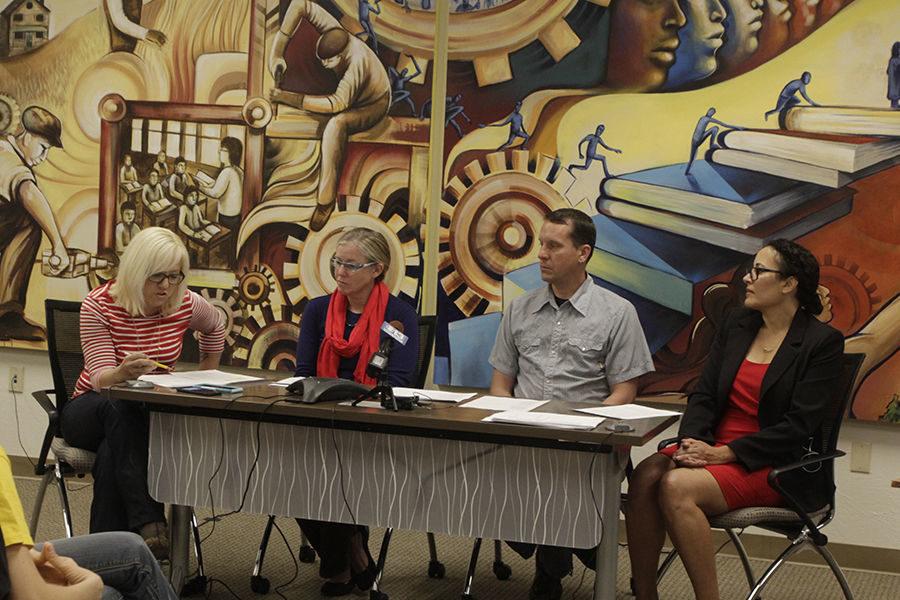CFA strike averted, salary vote set for May
CFA Communications Specialist Niesha Gates; CFA President Jennifer Eagan; CFA Sacramento Chapter President Kevin Wehr; and CFA Chief Negotiator Kathy Sheffield hold a telephone press conference with CSU Chancellor Timothy White, Friday, April 8. The CFA and the CSU reached a three-year salary agreement, calling off the five-day strike that was to occur.
April 14, 2016
After months of deliberating, negotiating and agitating, the California Faculty Association has made a tentative agreement with the California State University administration and called off what would have been the largest U.S. higher education strike in history.
The CSU has agreed to award faculty a 10.5 percent raise in three installments over the next two years.
The CFA’s rallying cries throughout the leadup to the strike were “Fight for five” and “Five is fair,” referencing their demands for a 5 percent salary increase. Kevin Wehr, president of the Sacramento chapter of the CFA and head of the bargaining team, said that making the first salary increase 5 percent was “symbolically important.” That 5 percent increase is not retroactive for the 2015-16 fiscal year, though.
Also, because the CSU and CFA were in negotiations for so long, the previously budgeted 2 percent raise was not awarded to faculty for 2015-16. Chancellor White said that unspent money, along with another 2 percent raise that had been budgeted for 2016-17 and some savings carried forward from this year, was what made the 10.5 percent raise feasible without taking away from other CSU programs.
Chancellor White said the total faculty salary cost over the agreement period ending June 30, 2018, including these percentage increases, would be approximately $200 million.
Chancellor White had said previously that the CSU system could not spend money it didn’t have, and that the only way to award the CFA the raise it was asking for was to divert funds from other vital projects.
White referred to the process of budgeting this raise for faculty as a “Rubik’s Cube” more than once during the press phone conference announcing the agreement last Friday.
“The innovative and creative solution that the CFA and CSU crafted was by moving the times around within the budget years to when the salary increases actually occurred,” White said.
While White said he was “delighted” with the outcome of the negotiations, CFA President Jennifer Eagan said it represented compromises on both sides. The fact that the first 5 percent raise will occur at the end of the year and not retroactively through the duration of the bargaining process, was one such compromise. Another was the doubling of the time it will take new CSU faculty to start vesting retirement health benefits.
During a Q&A session after the main announcement of the press conference call, White was asked why he waited so long to get directly involved in the negotiations.
“There is no I in Team,” White said. “I commend the individuals who did all the heavy lifting and analytical work and thoughtful exchange of ideas.”
Kevin Wehr, president of the Sacramento chapter of the CFA, said there was some amusement at CFA headquarters at that statement.
“President Eagan had been trying to get Chancellor White to engage with her for many months before he did,” Wehr said. “His response struck many people as a bit hollow.”
Eagan said that the usually mild-mannered faculty, librarians and coaches were only being so militant in their strike preparations because they were in crisis. Wehr said he hoped things wouldn’t have to escalate this much each time they renegotiated the faculty union contract.
“I’m ultimately disappointed in what I see as a lack of leadership,” Wehr said. “We could have not wasted a whole lot of time and effort with the last six to nine months.”
The CFA membership will vote on the salary agreement by the end of April, and the CSU Board of Trustees will make their final vote on May 24.
Eagan gave some insight into how this salary increase will directly benefit students.
“Faculty working conditions are student learning conditions,” Eagan said. “When faculty are treated like professionals, have high morale, and aren’t wondering how to pay their bills at the end of the month, they can focus on the academic work that they’re doing on the campuses.”
































































































































